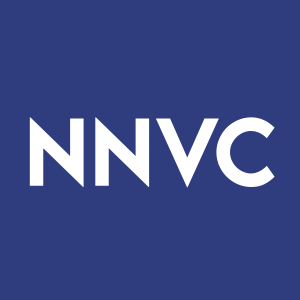NanoViricides Measles Drug Development Animal Study is Imminent
Rhea-AI Summary
Positive
- NV-387 previously demonstrated success in curing lethal RSV infection in animals
- Drug addresses clear unmet medical need with no currently approved treatments for measles
- Clinical stage drug can be rapidly developed for measles treatment
- Broad-spectrum antiviral approach could potentially combat emerging measles virus genotypes
- Technology platform designed to prevent viral escape through host-mimetic mechanism
Negative
- Drug is still in early development phase requiring animal studies
- Success in RSV does not guarantee effectiveness against measles
- Lengthy and capital-intensive drug development process ahead
- No human clinical trial data available for measles indication
News Market Reaction 1 Alert
On the day this news was published, NNVC gained 6.80%, reflecting a notable positive market reaction.
Data tracked by StockTitan Argus on the day of publication.
SHELTON, CT / ACCESS Newswire / June 4, 2025 / NanoViricides, Inc., a publicly traded company (NYSE Amer.:NNVC) (the "Company"), and a clinical stage, leading global pioneer in the development of broad-spectrum antivirals based on host-mimetic nanomedicine technology that viruses cannot escape, announces that it is forging ahead with its Measles drug development program.
The Company has commissioned an animal trial to evaluate certain drug candidates in a lethal animal infection model. The Company has secured specially modified mice that bear the human form of CD150/SLAM protein that the Measles virus requires to enter cells. The Company will initiate the study as soon as the animals arrive and are acclimatized at the animal study laboratory.
"NV-387 actually cured lethal RSV infection in animals, and Measles is a cousin of RSV," said Anil R. Diwan, Ph.D., President and Executive Chairman of the Company, adding, "This gives us confidence that NV-387 will have strong activity against Measles virus as well."
NV-387 is a clinical stage broad-spectrum antiviral drug that is designed to act as a decoy of a cell, attacking the virus by presenting to it the very features that the virus requires for binding to the cell, and upon binding, destroying the virus particle so it cannot infect. Over 90
There is no approved drug for the treatment of Measles virus infection. Recently, CDC included Vitamin A as part of the standard of care for Measles infection. Vitamin A is known to help malnourished children with Measles, but its role as supplementary addition to non-deficient patients is not known. CDC also recommended use of ribavirin in extreme cases as a last resort. Ribavirin is a toxic nucleoside analog and is not approved for treatment of Measles.
Thus there is a clear unmet need for a Measles drug. NV-387, a clinical stage drug can be rapidly developed to meet this need. The animal study of effectiveness of NV-387 in h-SLAM-modified mice will provide important information regarding potential human effectiveness of NV-387 to treat Measles virus infection.
Measles outbreaks have continued to expand in the US, reaching a record 1,088 confirmed cases across 33 jurisdictions from January 1 through May 29, 2025 according to CDC (https://www.cdc.gov/measles/data-research/index.html). Europe has witnessed a dramatic ten-fold increase in measles cases last year, i.e. 2024, over 2023.
Measles vaccination rates have been declining in the USA since the COVID pandemic, according to a June 3, 2025 Johns Hopkins University news report (https://hub.jhu.edu/2025/06/03/united-states-measles-vaccination-rate-declines/). The average county-level MMR vaccination rate in the USA fell from
Additionally, Measles vaccine failure cases have also been increasing according to the European data, which is an important cause for concern. It is likely that the increase in vaccine failure rate may be due to the increase in a new genotype, D8 of the Measles virus, replacing the previous dominant B3 genotype. The B3 genotype is closer to the Measles vaccine live attenuated Enders-Edmonton "Moraten" strain that has been used in the USA since 1968.
The changing genotypes suggest that the Measles virus is likely drifting away from the current vaccine.
In this global scenario, NV-387, the clinical stage broad-spectrum, host-mimetic antiviral nanomedicine drug could perhaps be the only currently available drug candidate to combat the Measles virus and disease.
Measles cases in Europe were over 35,000 in 2024, an almost ten-fold increase from 2023, according to the annual report of European Center for Disease Prevention and Control (ECDC). Only approximately
The significant Measles vaccine failure rate observed in Europe is alarming, considering that the two-dose vaccine is supposed to be
Given the various causes of vaccine failure, and of vaccine hesitancy, attaining
ABOUT NANOVIRICIDES
NanoViricides, Inc. (the "Company") (www.nanoviricides.com) is a publicly traded (NYSE-American, stock symbol NNVC) clinical stage company that is creating special purpose nanomaterials for antiviral therapy. The Company's novel nanoviricide™ class of drug candidates and the nanoviricide™ technology are based on intellectual property, technology and proprietary know-how of TheraCour Pharma, Inc. The Company has a Memorandum of Understanding with TheraCour for the development of drugs based on these technologies for all antiviral infections. The MoU does not include cancer and similar diseases that may have viral origin but require different kinds of treatments.
The Company has obtained broad, exclusive, sub-licensable, field licenses to drugs developed in several licensed fields from TheraCour Pharma, Inc. The Company's business model is based on licensing technology from TheraCour Pharma Inc. for specific application verticals of specific viruses, as established at its foundation in 2005.
Our lead drug candidate is NV-387, a broad-spectrum antiviral drug that we plan to develop as a treatment of RSV, COVID, Long COVID, Influenza, and other respiratory viral infections, as well as MPOX/Smallpox infections. Our other advanced drug candidate is NV-HHV-1 for the treatment of Shingles. The Company cannot project an exact date for filing an IND for any of its drugs because of dependence on a number of external collaborators and consultants. The Company is currently focused on advancing NV-387 into Phase II human clinical trials.
The Company is also developing drugs against a number of viral diseases including oral and genital Herpes, viral diseases of the eye including EKC and herpes keratitis, H1N1 swine flu, H5N1 bird flu, seasonal Influenza, HIV, Hepatitis C, Rabies, Dengue fever, and Ebola virus, among others. NanoViricides' platform technology and programs are based on the TheraCour® nanomedicine technology of TheraCour, which TheraCour licenses from AllExcel. NanoViricides holds a worldwide exclusive perpetual license to this technology for several drugs with specific targeting mechanisms in perpetuity for the treatment of the following human viral diseases: Human Immunodeficiency Virus (HIV/AIDS), Hepatitis B Virus (HBV), Hepatitis C Virus (HCV), Rabies, Herpes Simplex Virus (HSV-1 and HSV-2), Varicella-Zoster Virus (VZV), Influenza and Asian Bird Flu Virus, Dengue viruses, Japanese Encephalitis virus, West Nile Virus, Ebola/Marburg viruses, and certain Coronaviruses. The Company intends to obtain a license for RSV, Poxviruses, and/or Enteroviruses if the initial research is successful. As is customary, the Company must state the risk factor that the path to typical drug development of any pharmaceutical product is extremely lengthy and requires substantial capital. As with any drug development efforts by any company, there can be no assurance at this time that any of the Company's pharmaceutical candidates would show sufficient effectiveness and safety for human clinical development. Further, there can be no assurance at this time that successful results against coronavirus in our lab will lead to successful clinical trials or a successful pharmaceutical product.
This press release contains forward-looking statements that reflect the Company's current expectation regarding future events. Actual events could differ materially and substantially from those projected herein and depend on a number of factors. Certain statements in this release, and other written or oral statements made by NanoViricides, Inc. are "forward-looking statements" within the meaning of Section 27A of the Securities Act of 1933 and Section 21E of the Securities Exchange Act of 1934. You should not place undue reliance on forward-looking statements since they involve known and unknown risks, uncertainties and other factors which are, in some cases, beyond the Company's control and which could, and likely will, materially affect actual results, levels of activity, performance or achievements. The Company assumes no obligation to publicly update or revise these forward-looking statements for any reason, or to update the reasons actual results could differ materially from those anticipated in these forward-looking statements, even if new information becomes available in the future. Important factors that could cause actual results to differ materially from the company's expectations include, but are not limited to, those factors that are disclosed under the heading "Risk Factors" and elsewhere in documents filed by the company from time to time with the United States Securities and Exchange Commission and other regulatory authorities. Although it is not possible to predict or identify all such factors, they may include the following: demonstration and proof of principle in preclinical trials that a nanoviricide is safe and effective; successful development of our product candidates; our ability to seek and obtain regulatory approvals, including with respect to the indications we are seeking; the successful commercialization of our product candidates; and market acceptance of our products.
The phrases "safety", "effectiveness" and equivalent phrases as used in this press release refer to research findings including clinical trials as the customary research usage and do not indicate evaluation of safety or effectiveness by the US FDA.
FDA refers to US Food and Drug Administration. IND application refers to "Investigational New Drug" application. cGMP refers to current Good Manufacturing Practices. CMC refers to "Chemistry, Manufacture, and Controls". CHMP refers to the Committee for Medicinal Products for Human Use, which is the European Medicines Agency's (EMA) committee responsible for human medicines. API stands for "Active Pharmaceutical Ingredient". WHO is the World Health Organization. R&D refers to Research and Development.
Contact:
NanoViricides, Inc.
info@nanoviricides.com
Public Relations Contact:
ir@nanoviricides.com
SOURCE: NanoViricides
View the original press release on ACCESS Newswire








